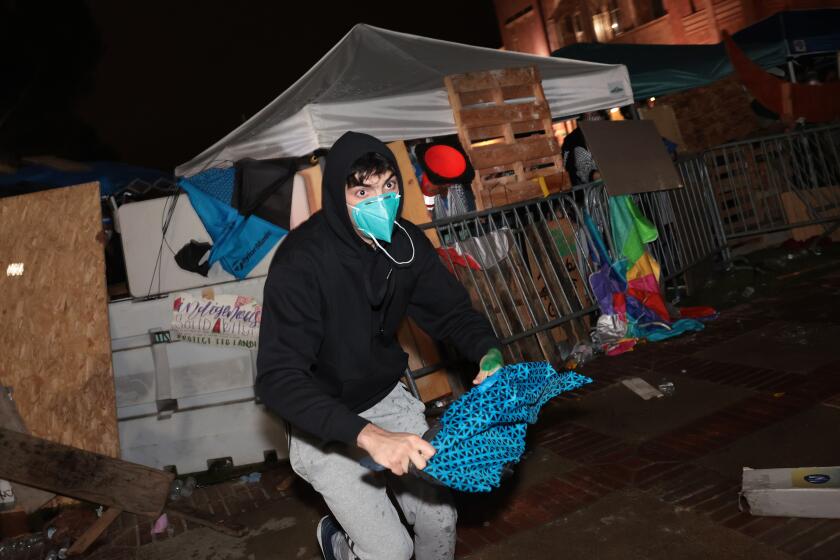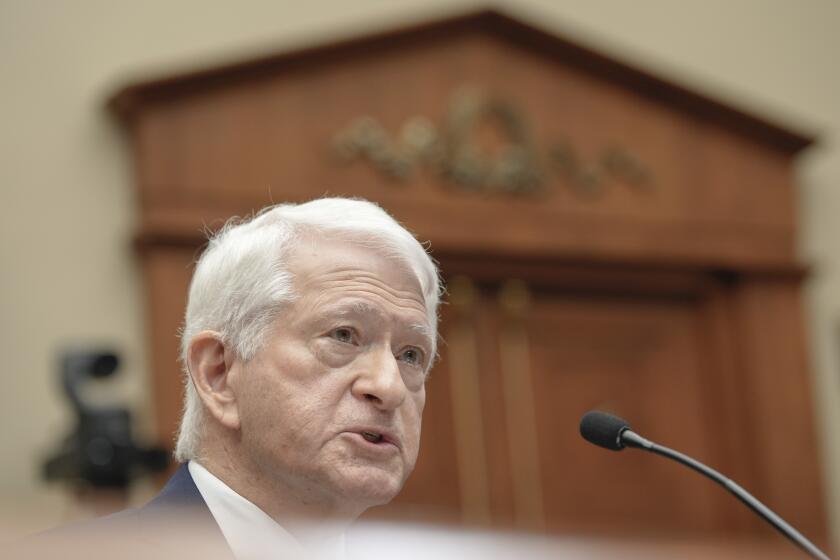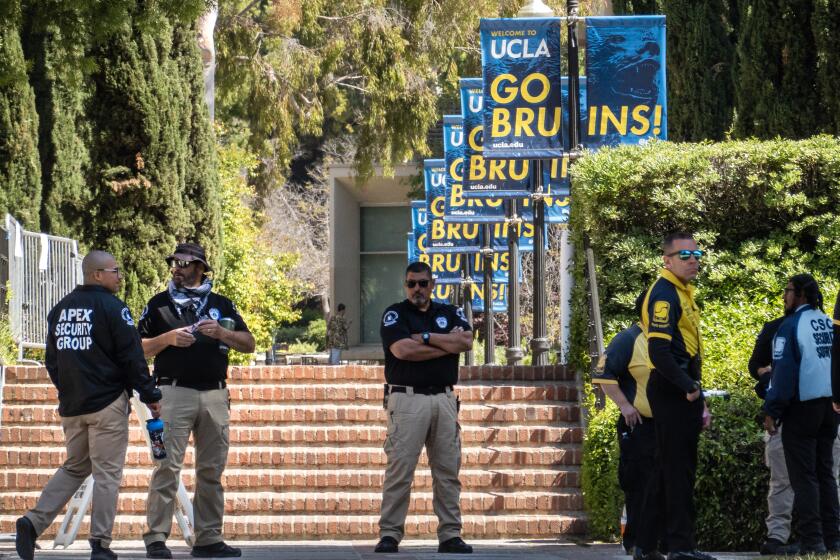UCLA has a new chancellor: Julio Frenk, University of Miami president, global health expert
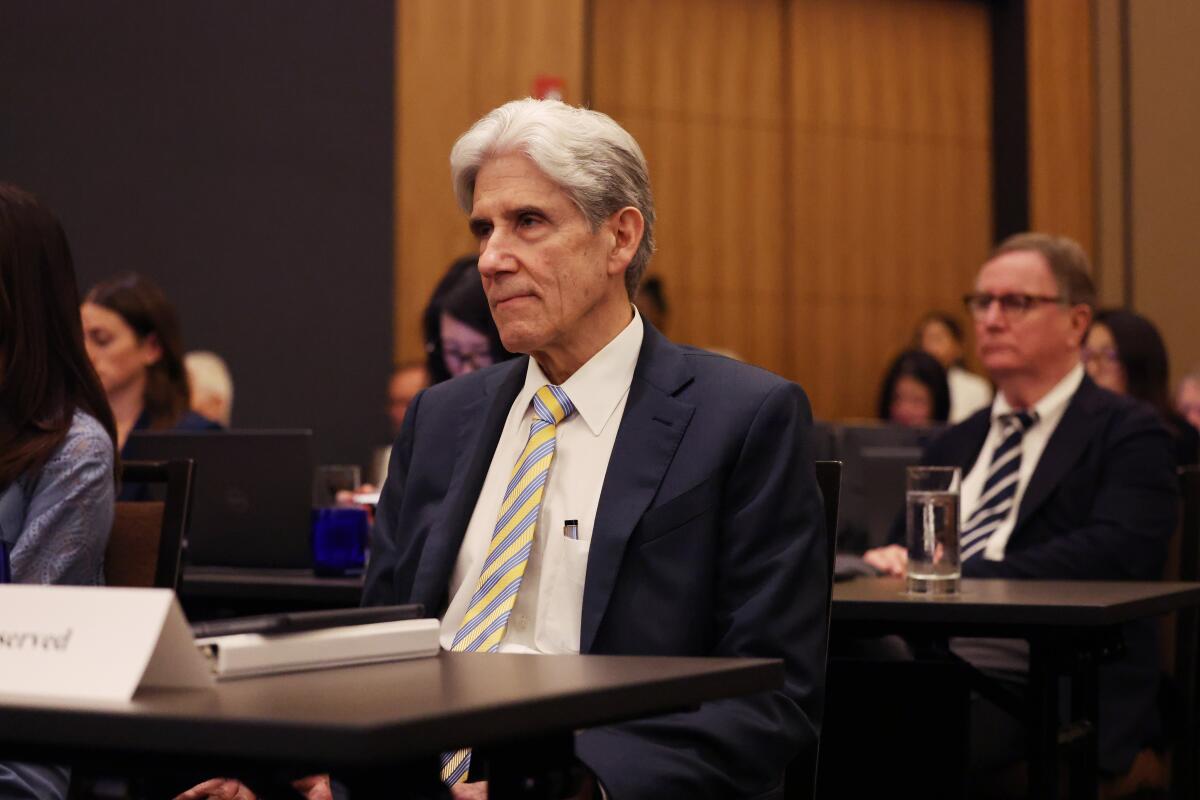
- Share via
University of Miami President Julio Frenk, a Mexico-born global health expert, will become the next chancellor of UCLA and first Latino tapped to lead the nation’s top public research university as the campus faces a dark time of divisive protests.
Frenk, 70, will bring deep expertise in public health, a medical degree and experience as Mexico’s former health minister to the Westwood campus — equipping him to oversee its comprehensive network of hospitals and clinics along with the large academic enterprise of 46,700 students. Frenk has also proved to be a prodigious fundraiser, leading a $2.5-billion campaign for the University of Miami’s centennial next year and quadrupling contributions as Harvard’s dean of the school of public health — helping secure a historic $350-million endowment gift.
Frenk will succeed Chancellor Gene Block, who will step down July 31 after a 17-year tenure that included steering UCLA through a financial crisis and global pandemic to reach new heights in expanding enrollment, diversity, philanthropy and research funding.
Frenk will not take the reins until January 2025. Darnell Hunt, UCLA’s executive vice chancellor and provost, will serve as interim chancellor until then after Block returns to his faculty position as a researcher in sleep cycles and circadian rhythms.
UC regents on Wednesday unanimously approved the appointment of Frenk, who was recommended by UC President Michael V. Drake. He will earn an annual base salary of $978,904 — a significant reduction from his University of Miami base pay of $1.68 million. Frenk told regents he was excited by the opportunity to help lift up students and the broader community through UCLA’s life-changing education, research and public service. He added that at a time of growing mistrust toward higher education, UCLA and other universities must “passionately articulate the many societal benefits” they bring.
“For many people around the world, UCLA is known as a dream school, and this is truly a dream job for me,” said Frenk, who received a standing ovation after the vote.
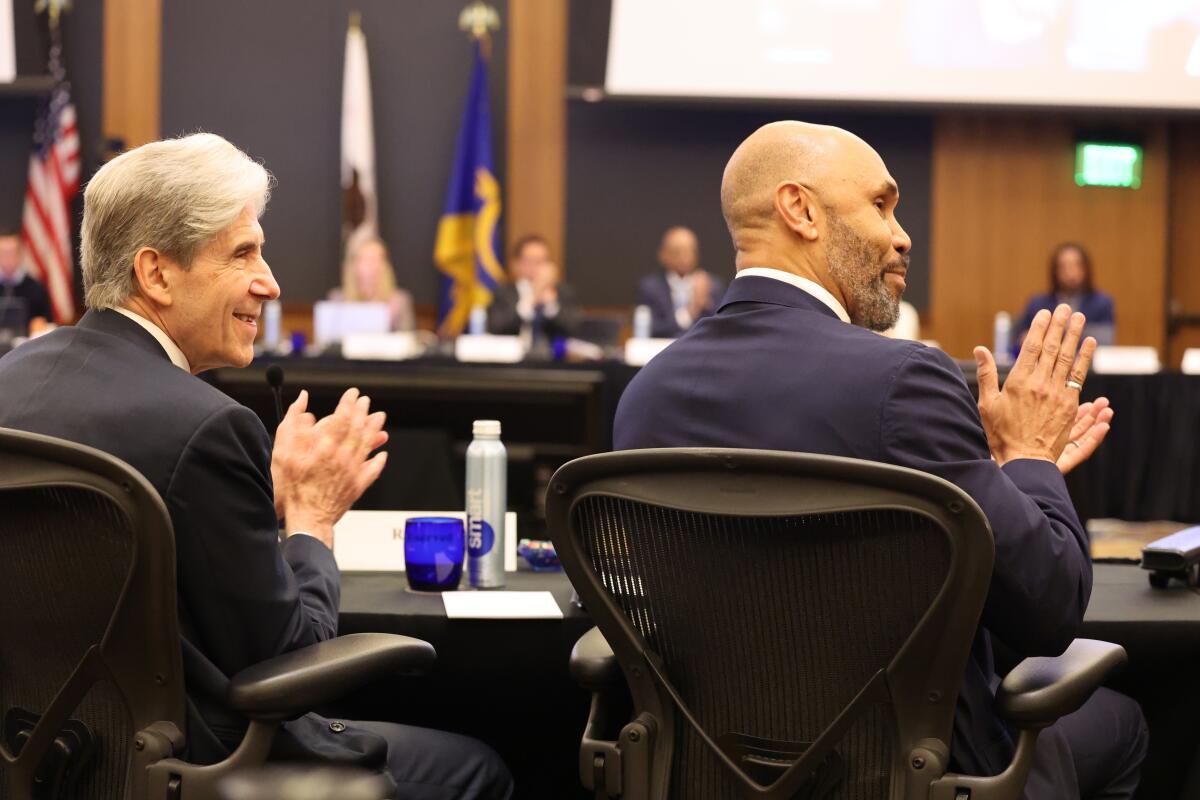
Frenk will come to UCLA at a particularly fraught time, as protests over the Israel-Hamas war, labor strife, mounting burdens on faculty and lingering pandemic blues have roiled the campus. Despite UCLA’s top academic ranking and status as the most applied-to university in the nation, many campus members report what they say is unprecedented division, acrimony, burnout and malaise. The division was reflected in a close but unsuccessful faculty vote to censure Block and express no confidence in his leadership handling the university’s response to a pro-Palestinian encampment and mob attack against it.
In several recent interviews with UCLA faculty and students about their hopes for the next chancellor, the dominant issue raised was the need to unify the shattered campus.
“Historically, I don’t think we’ve seen this much division — it’s difficult to hold the community together,” said Andrea Kasko, UCLA Academic Senate chair. “The next chancellor is going to have to rebuild trust with everyone, do a lot of listening. The community needs to heal.”
Frenk’s background may suit him to that task. As the son of a German Jewish father who fled Nazi Germany in the 1930s, he has a personal sensitivity to antisemitism; he also has lauded the power of tolerance, inclusion, generosity and kindness he says Mexicans offered his displaced family, helping them succeed.
In remarks Wednesday to the regents and, later, the media, Frenk called himself a “boundary spanner” who has bridged various countries and disciplines and would bring that approach to his campus work in celebrating the “richness of differences.... We need to appreciate that against a background of difference there is a commonality, a common humanity that remains everywhere and that’s what we need to build on,” he said.
He added that his first actions would be “purposeful listening” to students, faculty, staff, alumni and other campus constituencies to learn about UCLA and its challenges and opportunities. In response to several questions about how he would handle campus protests and policing, he said he looked forward to learning more about the issues at hand, including the investigations underway.
Frenk has not dealt with the intense pro-Palestinian protests and counterprotests that have ignited violence, aggressive police actions, arrests and student disciplinary cases at UCLA and other campuses across the country. University of Miami students have not organized a pro-Palestinian encampment; a campus talk two months ago by survivors of the Oct. 7 Hamas attack on Israel appears to have drawn no protests.
Here is what we know about the last couple of weeks on campus, based on interviews, recordings, social media and documents.
At UCLA, Frenk also will face controversy over policing and safety practices. While UCLA leadership has been criticized for failing to secure enough law enforcement to stem attacks against pro-Palestinian protesters on April 30 and May 1, others are highly critical of the current level of policing.
Carlos Santos, an associate professor of social welfare, said the new chancellor must address rising concerns about what some campus members see as excessive use of police force and punishment against peaceful protesters.
And how well Frenk will transition from a career at smaller private universities — the University of Miami has 18,000 students — to the much larger public UCLA and the 10-campus UC system remains to be seen.
At UC Berkeley, for instance, faculty advocated for an internal candidate to replace outgoing Chancellor Carol Christ, given the campus complexities, and got one in business school Dean Rich Lyons, who will take the helm July 1. Some UCLA faculty have raised similar questions about the ability of an outsider to grasp and manage UC’s largest campus without experience in the system.
Shane White and Michael Meranze, former UCLA Academic Senate chairs, said faculty numbers have not kept up with expanding student enrollment, leading to larger workloads and burnout. Between 2011 and 2023, UCLA’s student enrollment increased by 18.8% but Academic Senate faculty members grew by less than 2%.
In addition, Kasko said, staffing shortages have saddled faculty with more bureaucratic tasks, leading to less time for teaching and research.
The three faculty leaders also said that graduate students need to be better supported with funding or the campus will have to shrink their numbers and risk losing the young intellectual talent crucial to UC’s powerful research enterprise.
Republicans questioned UCLA Chancellor Gene Block and the presidents of Northwestern and Rutgers university on the their handling of pro-Palestinian encampments, including UCLA “checkpoints” put up by protesters that prevented people they identified as Zionists from entering a camp.
“We need more classrooms, faculty and graduate students,” White said. “We are supposed to be the brain trust for the next inventors and Silicon Valley startups to deliver what society needs.”
Witnesses accused guards from Apex Security Group of acting aggressively at UCLA in recent weeks, including one incident where a student protester was punched in the face.
James Steintrager, the UC systemwide Academic Senate chair, said Frenk’s ability to straddle the worlds of university research and healthcare delivery made him an excellent fit for UCLA. “The pool of candidates to lead this premier public university was remarkable, yet Dr. Frenk stood out for his unique combination of scholarly, medical, administrative, and political expertise,” he said in a statement.
Among students, many say the cost of housing, food, transportation and other financial needs is an ongoing problem. Adam Tfayli, UCLA student body president, said the next chancellor should be more attentive to those needs and more accessible to students to hear their concerns, such as campus safety and growing feelings of alienation lingering from the pandemic and remote learning.
“The current campus climate is at an all-time low,” he said. “People are not necessarily as connected.”
Frenk addressed such needs at the University of Miami when he took office in 2015. In his inaugural speech, he announced two major commitments: create 100 new endowed positions to attract and retain the best faculty, and raise support for students to meet 100% of demonstrated financial need.
He also has praised student activism. In a column for the University of Miami student newspaper, he lauded his students — some of whom were graduates of Marjory Stoneman Douglas High School in Parkland, Fla., where a gunman killed 17 people in 2018 — for their advocacy against gun violence. He said their “refusal to stay silent in the face of violence and intimidation” inspired him.
Frenk’s biggest professional passion is global health. A fourth-generation physician, he earned his medical degree from the National Autonomous University of Mexico in 1979. He also received master’s degrees in public health and sociology and a joint doctorate in medical care organization and sociology from the University of Michigan at Ann Arbor.
Frenk served as health minister under President Vicente Fox from 2000 to 2006 and is credited with introducing universal health insurance, Seguro Popular, which expanded access to healthcare for millions of uninsured Mexicans. He expanded access to family planning and contraception — which drew criticism from some conservatives. He also worked as a senior fellow for the global health program at the Bill and Melinda Gates Foundation and was a director at the World Health Organization in Geneva.
At Harvard, Frenk is credited with balancing the school of public health’s budget, diversifying research and helping land the $350-million gift, the largest in Harvard’s history.
Frenk is married to Felicia Knaul, a health economist; the couple have two children. In addition to scholarly articles, he has written two children’s books about the human body, and enjoys opera, biking, soccer and football.
“Dr. Frenk has demonstrated a powerful commitment to the health and well-being of people, institutions, and systems around the world,” Drake said in a statement. “His leadership will build on the growth and strength the campus has achieved under Chancellor Block and accelerate UCLA’s brilliant trajectory in service to Los Angeles, the nation, and the world.”
More to Read
Sign up for Essential California
The most important California stories and recommendations in your inbox every morning.
You may occasionally receive promotional content from the Los Angeles Times.
